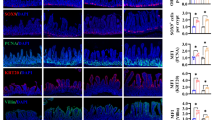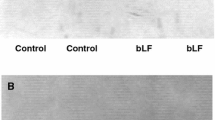Abstract
Our previous studies showed that dietary nucleotides fed to mice enhanced the secretion of interleukin 7 (IL-7) and transforming growth factor β (TGF-β) from intestinal epithelial cells (IECs). To explore whether nucleotides influence IECs directly to enhance the secretion of the cytokines or not, the effects of nucleotides added in vitro on the cytokine secretion from primary-cultured murine IECs were examined. When the mixture of nucleotide 5′-monophosphates (CMP, GMP, IMP, and UMP) or individual nucleotide 5′-monophosphates were added to the primary culture of IECs derived from BALB/c mice, the secretion of IL-7, but not that of TGF-β, was increased significantly. Addition of nucleotides to the culture did not alter the number of the IECs. Secretion of IL-6 and granulocyte-macrophage colony-stimulating factor, which are known to be secreted from IECs, was not enhanced by the addition of nucleotides. These results demonstrate that nucleotides can affect IECs directly to enhance the secretion of IL-7, and suggest that the increased secretion of TGF-β from IECs by dietary nucleotides was due to indirect effects of the nucleotides, which may affect intestinal microflora or cells other than IECs that in turn influence the cytokine secretion of IECs.
Similar content being viewed by others
References
Beagley KW and Husband AJ (1998) Intraepithelial lymphocytes: Origins, distribution, and function. Crit Rev Immunol 18: 237–254.
Carver JD, Pimentel B, Cox WI and Barness LA (1991) Dietary nucleotide effects upon immune function in infants. Pediatrics 88: 359–363.
Cressman VL, Lazarowski E, Homolya L, Boucher RC, Koller BH and Grubb BR (1999) Effect of loss of P2Y(2) receptor gene expression on nucleotide regulation of murine epithelial Cl(–) transport. J Biol Chem 274: 26461–26468.
Di Virgilio F, Chiozzi P. Ferrari D, Falzoni S, Sanz JM, Morelli A, Torboli M, Bolognesi G and Baricordi R (2001) Nucleotide receptors: An emerging family of regulatory molecules in blood cells. Blood 97: 587–600.
Galliaerde V, Desvignes C, Peyron E and Kaiserlian D (1995) Oral tolerance to haptens: Intestinal epithelial cells from 2,4-dinitrochlorobenzene-fed mice inhibit hapten-specific T cell activation in vitro. Eur J Immunol 25: 1385–1390.
Hershberg RM and Mayer LF (2000) Antigen processing and presentation by intestinal epithelial cells – Polarity and complexity. Immunol Today 21: 123–128.
Janas LM and Picciano MF (1982) The nucleotide profile of human milk. Pediatr Res 16: 659–662.
Jung HC, Eckmann L, Yang SK, Panja A, Fierer J, Morzycka Wroblewska E and Kagnoff MF (1995) A distinct array of proinflammatory cytokines is expressed in human colon epithelial cells in response to bacterial invasion. J Clin Invest 95: 55–65.
Jyonouchi H, Zhang L and Tomita Y (1993) Studies of immunomodulating actions of RNA/nucleotides. RNA/nucleotides enhance in vitro immunoglobulin production by human peripheral blood mononuclear cells in response to T-dependent stimuli. Pediatr Res 33: 458–465.
Jyonouchi H, Sun S, Winship T and Kuchan MJ (2001) Dietary ribonucleotides modulate type 1 and type 2 T-helper cell responses against ovalbumin in young BALB/cJ mice. J Nutr 131: 1165–1170.
Kulkarni A, Fanslow W, Rudolph F and Buren CV (1986) Effect of dietary nucleotides on response to bacterial infections. J Parenter Enteral Nutr 10: 169–171.
Laky K, Lefrancois L, von Freeden Jeffry U, Murray R and Puddington L (1998) The role of IL-7 in thymic and extrathymic development of TCR gamma delta cells. J Immunol 161: 707–713.
Laky K, Lefrancois L, Lingenheld EG, Ishikawa H, Lewis JM, Olson S, Suzuki K, Tigelaar RE and Puddington L (2000) Enterocyte expression of interleukin 7 induces development of γ δ T cells and Peyer's patches. J Exp Med 191: 1569–1580.
Leleiko NS, Martin BA, Walsh M, Kazlow P, Rabinowitz S and Sterling K (1987) Tissue-specific gene expression results from a purine-and pyrimidine-free diet and 6-mercaptopurine in the rat small intestine and colon. Gastroenterology 93: 1014–1020.
Maki K, Sunaga S, Komagata Y, Kodaira Y, Mabuchi A, Karasuyama H, Yokomuro K, Miyazaki J and Ikuta K (1996) Interleukin 7 receptor-deficient mice lack γ δ T cells. Proc Natl Acad Sci USA 93: 7172–7177.
Nagafuchi S, Katayanagi T, Nakagawa E, Takahashi T, Yajima T, Yonekubo A and Kuwata T (1997) Effects of dietary nucleotides on serum antibody and splenic cytokine production in mice. Nutr Res 17: 1163–1174.
Nagafuchi S, Hachimura S, Totsuka M, Takahashi T, Goto M, Yajima T, Kuwata T, Habu S and Kaminogawa S (2000) Dietary nucleotides can up-regulate antigen-specific Th1 immune responses and suppress antigen-specific IgE responses in mice. Int Arch Allergy Immunol 122: 33–41.
Nagafuchi S, Totsuka M, Hachimura S, Goto M, Takahashi T, Yajima T, Kuwata T and Kaminogawa S (2000) Dietary nucleotides increase the proportion of a TCR γ δ + subset of intraepithelial lymphocytes (IEL) and IL-7 production by intestinal epithelial cells (IEC); Implications for modification of cellular and molecular cross-talk between IEL and IEC by dietary nucleotides. Biosci Biotechnol Biochem 64: 1459–1465.
Nagafuchi S, Totsuka M, Hachimura S, Goto M, Takahashi T, Yajima T, Kuwata T and Kaminogawa S (2003) Dietary nucleotides increase the mucosal IgA response and the secretion of transforming growth factor β from intestinal epithelial cells in mice. Cytotechnology 40: 49–58.
Napolitano LM, Buzdon MM, Shi HJ and Bass BL (1997) Intestinal epithelial cell regulation of macrophage and lymphocyte interleukin 10 expression. Arch Surg 132: 1271–1276.
Panja A, Siden E and Mayer L (1995) Synthesis and regulation of accessory/proinflammatory cytokines by intestinal epithelial cells. Clin Exp Immunol 100: 298–305.
Sato N, Nakano T, Kawakami H and Idota T (1999) In vitro and in vivo effects of exogenous nucleotides on the proliferation and maturation of intestinal epithelial cells. J Nutr Sci Vitaminol 45: 107–118.
Stadnyk AW(1994) Cytokine production by epithelial cells. FASEB J 8: 1041–1047.
Sudo N, Sawamura S, Tanaka K, Aiba Y, Kubo C and Koga Y (1997) The requirement of intestinal bacterial flora for the development of an IgE production system fully susceptible to oral tolerance induction. J Immunol 159: 1739–1745.
Sudo N, Aiba Y, Takaki A, Tanaka K, Yu XN, Oyama N, Koga Y and Kubo C (2000) Dietary nucleic acids promote a shift in Th1/Th2 balance toward Th1-dominant immunity. Clin Exp Allergy 30: 979–987.
Tanaka R and Mutai M. (1980) Improved medium for selective isolation and enumeration of Bifidobacterium. Appl Environ Microbiol 40: 866–869.
Tanaka M, Lee K, Martinez Augustin O, He Y, Sanderson IR and Walker WA (1996) Exogenous nucleotides alter the proliferation, differentiation and apoptosis of human small intestinal epithelium. J Nutr 126: 424–433.
Umesaki Y and Setoyama H (2000) Structure of the intestinal flora responsible for development of the gut immune system in a rodent model. Microbes Infect 2: 1343–1351.
Van der Wijk T, De Jonge HR and Tilly BC (1999) Osmotic cell swelling-induced ATP release mediates the activation of extracellular signal-regulated protein kinase (Erk)-1/2 but not the activation of osmo-sensitive anion channels. Biochem J 343: 579–586.
Author information
Authors and Affiliations
Rights and permissions
About this article
Cite this article
Murakami, R., Yamada, K., Nagafuchi, S. et al. Nucleotides enhance the secretion of interleukin 7 from primary-cultured murine intestinal epithelial cells. Cytotechnology 40, 59–65 (2002). https://doi.org/10.1023/A:1023914105151
Issue Date:
DOI: https://doi.org/10.1023/A:1023914105151




